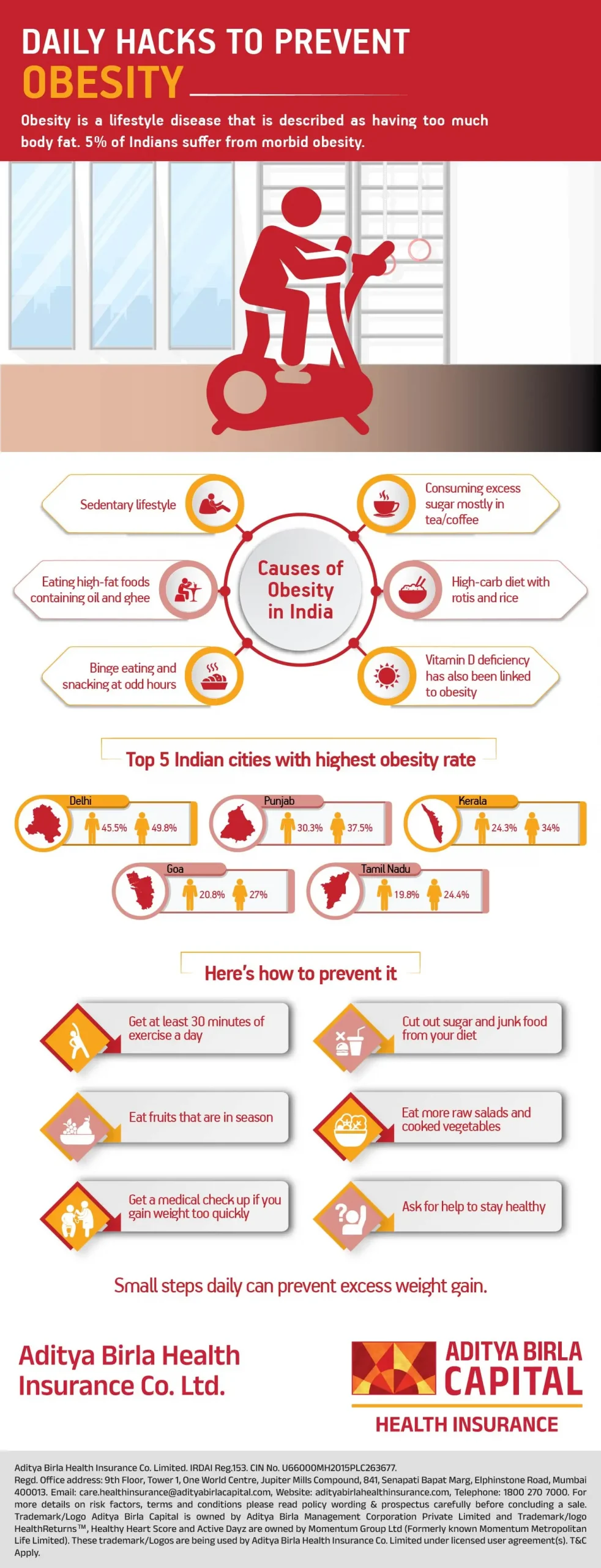
Preventing obesity isn’t about quick fixes — it’s about smart, sustainable habits that fit into your real life. Let’s break down simple, science-backed strategies to help you stay healthy, energized, and in control.
What is obesity?

Obesity refers to an increase in the body’s size and the number of fat cells. It stems from various factors, including behaviors like eating patterns, insufficient sleep or physical activity, certain medications, and genetics, along with family history.
Be informed about obesity
Our modern lifestyle includes spending too much time sitting, eating junk and processed food, not eating enough fruits and vegetables, and not getting enough exercise. All of these factors contribute to weight gain. Uncontrolled weight gain can lead to obesity.
The Body Mass Index (BMI) determines the difference between being overweight and obese. BMI can be calculated by dividing your weight in kg by the square of your height in meters. You can also find BMI calculators online. For adults, the normal BMI ranges from 18.5 to 24.9. Between 25 and 29.9 is considered overweight, and 30 and above is obese.
Obesity can lead to other health problems like cardiovascular disease, diabetes, and a higher risk of stroke. A few simple daily habits like exercising for 30 minutes a day, eating less sugar and fast food, and eating more fruits and vegetables can help prevent obesity. Get medical help if you gain weight too quickly.
Factors affecting weight
Many factors can influence a person’s weight. These include:
Lifestyle habits and behaviors
A lack of physical activity, sedentary behaviors, an unhealthy diet, and inadequate sleep can all contribute to obesity.
Environment
Your environment, including your home and family lifestyle habits, also impacts your weight.
Economic factors
These can affect the foods you can afford and other lifestyle habits, impacting your weight.
Family history
If obesity or being overweight runs in your family, you may be more genetically predisposed to gaining weight. This can affect how your body stores fat, how efficiently you burn calories, and even your hunger and satiety signals.
Metabolism
Metabolism, or the process by which your body converts food into energy, can influence your ability to manage weight.
Does breastfeeding prevent obesity?
The longer babies are breastfed (as opposed to just receiving breast milk from a bottle), the less likely they are to be overweight as they grow older. However, many formula-fed babies become healthy-weight adults.
Parents who can afford to stay home with their babies and breastfeed for three months or longer are likely to be from higher-income families and have better access to healthy food, healthcare, and exercise opportunities for their children. These advantages may explain the lower incidence of obesity among these children.
Healthy habits to prevent obesity
Consider adopting the following strategies to help minimize weight fluctuations by enhancing awareness of modifiable risk factors and promoting healthy lifestyle behaviors:
Eat breakfast daily
While skipping a meal is an easy way to cut calories, completely skipping breakfast can backfire when hunger strikes back mid-day, often leading to overeating. Breakfast doesn’t have to consist of a large bowl of cereal, eggs, and toast. It may consist of a slice of whole grain toast with nut butter, a hard-boiled egg, a leftover piece of chicken, and an orange, or a low-sugar protein smoothie blended with plain Greek yogurt, calcium-fortified plant milk, and fresh fruit.
Choose small portions and eat slowly
Taking your time while eating and using smaller bowls or plates can help prevent overeating by allowing the brain time to signal the stomach when it has had enough food. Limiting distractions, such as turning off screens from phones and computers, can also help us increase our focus and enjoyment of food.
Eat at home often
Fast food, restaurant meals, and other foods prepared outside the home typically have larger portions and richer ingredients. When preparing meals at home, you have greater control over the ingredients you use. If you feel too busy to cook, consider trying meal prep strategies.
Practise mindful eating
Contemplating why you’re eating and whether you’re genuinely hungry can assist you in making healthier food choices. When you eat, focus all your senses on the food—sight, smell, touch, and taste—so that you can fully enjoy what you eat.
Stay active with regular exercise
Regular movement is not only a key component of weight management but also provides numerous other health benefits, such as reducing the risk of chronic diseases and improving the quality of life for individuals with chronic illnesses and conditions. In children and adults, it is essential not only to increase physical activity but also to reduce sedentary behavior.
Foods to eat
Nutritional quality is important for maintaining a healthy weight; a nutritious eating pattern is essential for good health. Furthermore, the way we eat matters as well.
Vegetables

Vegetables are essential for a healthy diet; variety is just as crucial as quantity. No single vegetable supplies all the nutrients necessary for good health. Consume a variety of veggies daily. Including green vegetables like broccoli, cauliflower, cabbage, and spinach can support weight loss.
Eat a variety of types and colors of produce to provide your body with the mix of nutrients it requires. This ensures a greater diversity of beneficial plant chemicals and creates visually appealing meals.
Whole fruits
Incorporate a variety of fresh, whole fruits in different colors—like apples, bananas, pears, grapes, kiwis, oranges, melons, lemons, and limes—into your diet.
Healthy protein sources
Consider including plant-based protein sources in your diet, such as:
- Lentils and legumes (moong, rajma, chana, masoor)
- Tofu
- Quinoa
- Nuts and seeds (almonds, chia, flaxseeds)
- Edamame (young soybeans)
Also, add lean sources of animal proteins:
- Skinless chicken
- Eggs (especially boiled)
- Fish (salmon, tuna, mackerel)
- Low-fat dairy (Greek yogurt, cottage cheese, toned milk)
Whole grains
Incorporate whole grains such as oats, rye, brown rice, quinoa, whole wheat, barley, and millets (ragi, jowar, bajra) into your diet. Combine grains (e.g., brown rice + lentils, ragi + oats dosa) for enhanced nutrition and flavor.
Healthy fats
Top sources of healthy fats to prevent obesity include:
- Avocados
- Nuts (almonds, walnuts, pistachios)
- Seeds (chia, flaxseeds, sunflower, pumpkin)
- Olive oil (extra virgin)
- Coconut (fresh or oil, in moderation)
- Fatty fish (salmon, sardines, mackerel)
- Nut butters (peanut, almond)
Stay hydrated with water
Staying hydrated is essential for preventing obesity and managing weight. Strive for 8 to 10 glasses of water daily.
Foods to avoid
Consider steering clear of the following foods to improve management and prevention of obesity:
Sugary drinks
Avoid drinking sugar-sweetened beverages such as soda, fruit drinks, and high-sugar sports drinks.
Fruit juices
Avoid drinking fruit juices because they are:
- High in sugar
- Low in fiber
- Easy to overconsume
- A source of empty calories
Avoid consuming large quantities of packaged juices and fresh-pressed juices. Instead, focus on incorporating whole fruits and vegetable-based smoothies.
Refined grains
Refrain from consuming refined grains like white bread, white rice, and white pasta.
Red meat
Additionally, steer clear of red meat (beef, pork, and lamb) and processed red meats (salami, ham, and bacon sausage).
Ultra-processed foods with low nutritional value
Avoid ultra-processed foods with low nutritional value, including snacks and highly processed items like fast food, fries, donuts, cakes, candy, ice cream, packaged cookies, chips, and many breakfast cereals.
Strategies to maintain a healthy weight
Discover practical strategies to achieve and maintain a healthy weight through balanced eating, smart habits, and mindful movement.
- Eat well: Incorporate healthy foods in your diet and steer clear of unhealthy eating habits and foods as mentioned above.
- Stay active: To effectively manage weight through exercise, aim for at least 150 minutes of moderate-intensity aerobic activity per week, 75 minutes of vigorous-intensity activity, or a combination of both.
- Limit screen time: Watching television and other devices can be enjoyable and informative. However, it is linked to increased sedentariness, reduced exercise, weight gain, and body image issues among youth due to unrealistic portrayals of body size and habits.
- Get enough sleep: Chronic sleep deprivation (fewer than 7 hours per night) is linked to weight gain and obesity, increased abdominal fat, lower diet quality, heightened cravings, and challenges in managing weight. Poor sleep quality can also result in fatigue and a reduced desire to exercise.
- Practise self-care: The world today is filled with daily stress. This is a normal part of life, but when it becomes overwhelming, it can impact health and contribute to weight gain, leading to unhealthy eating habits, poor sleep quality, and other detrimental behaviors.
Regular physical activity effectively manages stress and controls weight gain. Practises such as meditation, deep breathing exercises, nature walks, spending time outdoors, and engaging in other relaxing and enjoyable activities are essential self-care strategies.
Small steps, big impact
Preventing obesity isn’t just about drastic diets or intense workouts; it’s about making sustainable lifestyle choices. Remember, consistency matters more than perfection. Start small, stay steady, and your body will appreciate it in the long run.
FAQs about preventing obesity
Got questions about staying healthy and preventing weight gain? Here are some commonly asked questions about obesity prevention, answered simply and clearly.
- How to reduce obesity naturally?
You can reduce obesity naturally by adopting a balanced lifestyle:
- Eat whole, unprocessed foods like fruits, vegetables, whole grains, lean proteins, and healthy fats.
- Exercise regularly with cardio, strength training, and daily movement.
- Stay hydrated and limit sugary drinks.
- Get enough sleep (7–9 hours) to support metabolism and hunger hormones.
- Practise mindful eating to avoid overeating and emotional snacking.
- Manage stress through yoga, meditation, or hobbies.
- Can stress cause obesity?
Yes, chronic stress can contribute to obesity. When stressed, your body releases cortisol, a hormone that can increase appetite and lead to cravings for high-fat, high-sugar comfort foods. Stress can also disrupt sleep, reduce motivation for physical activity, and promote emotional eating — all of which can lead to weight gain over time. Managing stress through relaxation techniques, regular exercise, and rest can help support a healthy weight.
- What are the top foods to avoid for weight management?
The top foods to avoid for weight management include sugary beverages, fruit juices, refined grains, red meat, and ultra-processed foods that are low in nutritional value.
- What are some common myths about preventing obesity?
Here are some common misconceptions about preventing obesity:
- You must skip meals to lose weight: Skipping meals can slow your metabolism and lead to overeating later.
- Carbs are the enemy: Not all carbs are bad — whole grains, fruits, and legumes are essential for energy and fiber.
- Fat-free means healthy: Many fat-free products are loaded with sugar and additives. Healthy fats are essential for fullness and hormone balance.
- Exercise alone is not enough: While important, exercise works best when combined with healthy eating and lifestyle habits.
- You can spot-reduce fat: Fat loss doesn’t work that way — it happens gradually across the whole body with consistent effort.
- How to prevent obesity in children and teenagers?
To prevent obesity in children and teenagers:
- Focus on gradually changing family eating habits and activity levels instead of concentrating on a child’s weight.
- Set a good example. Parents who eat healthy foods and engage in physical activities inspire their children to do the same.
- Encourage physical activity. Children should engage in 60 minutes of moderate physical activity most days of the week. More than 60 minutes of activity may promote weight loss and support weight maintenance.
- Limit screen time on phones, computers, and TVs to no more than one to two hours each day.
- Encourage children and teenagers to eat only when they are hungry and to take their time while eating.
- Avoid using food as a reward or withholding food as punishment.
- Keep the refrigerator stocked with fat-free or low-fat milk, fresh fruits and vegetables instead of sugary snacks and soft drinks.
- Serve at least five servings of fruits and vegetables each day.
- Encourage children and teens to drink water instead of sugary beverages, such as soft drinks, sports drinks, and fruit juice drinks.
- Eat meals together as a family. Family meals can foster healthier eating habits.
Key Takeaways
- Environmental factors, economic conditions, and metabolism can affect your weight.
- Have breakfast every day, enjoy meals at home frequently, and practise mindful eating to avoid obesity.
- Include fresh fruits and vegetables, healthy fats, and proteins in your diet. Also, avoid sugary drinks, fruit juices, and ultra-processed foods.
Stay tuned to the Activ Living Community. Keep up to date with the latest health tips and trends through expert videos, podcasts, articles, and much more on nutrition, fitness, mindfulness, and lifestyle conditions like Asthma, Blood Pressure, Cholesterol, and Diabetes. Activ Living ke saath sahi sehat ki shuruat ABHI karo.
You may also be interested in the following blogs:
- Fighting Obesity: Effective Treatment Options For Long-Term Success
- How To Prevent And Manage Obesity: A Complete Guide To Healthy Living
Popular Searches
How to lower blood pressure | Fruits good for liver | Unhealthy foods | Ragi Benefits | Basal Metabolic Rate | Acupressure points for High Blood Pressure | Ayurvedic medicine for blood pressure | How to control cholesterol at home | Homeopathy for Asthma | Biological Age | Home remedies for TB | Natural beta blockers | Negative effects of internet | Types of walking | Blood pressure calculator | Blood sugar calculator | BMI Calculator





 1800-270-7000
1800-270-7000










Like!! Great article post.Really thank you! Really Cool.